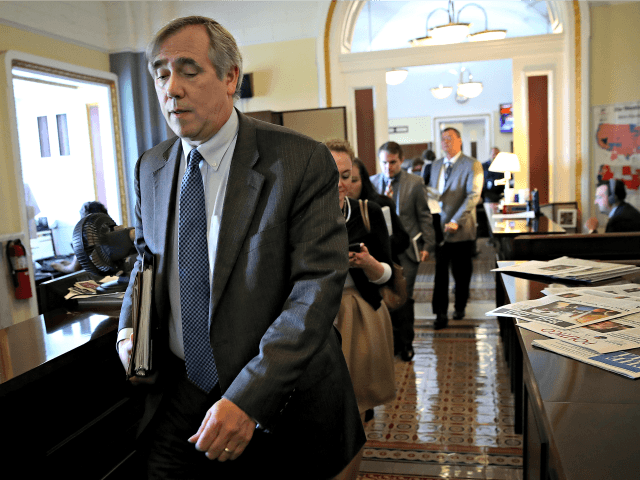Sen. Jeff Merkley (D-OR), a leading proponent of the Green New Deal, broke the No Fossil Fuel Money Pledge by accepting thousands of dollars from the very oil and gas lobbyists he claimed to be “at war” against.
Merkley, like his colleague and Green New Deal author Sen. Ed Markey (D-MA), took the pledge in December 2018 to the fanfare of national media. By signing, he vowed to never accept campaign donations totaling more than $200 from executives, PACs, and lobbyists representing companies “whose primary business is the extraction, processing, distribution, or sale of oil, gas, or coal.”
Merkley, who briefly considered running for president in 2020 on a climate change and pro-immigration platform, signed the pledge in front of one of Oregon’s largest television stations while flanked by climate change activists.
“I pledge not to take money from the oil, coal and gas industry, and instead prioritize the health of our families, climate, and democracy over fossil fuel industry profits,” Merkley said. “Now you realize, it’s not as if these companies were trying to give me money.”
“I’ve been at war with them. They weren’t about to give me money, nor do I want their help,” he added.
Merkley’s tough rhetoric turned out not to be very accurate. Campaign finance filings show the senator continued to get “help” in the form of political contributions from oil and gas lobbyists tied to interests he was supposedly at “war with” in the first half of 2019.
A top lobbyist for Chevron, Brian Arthur Pomper, contributed $1,000 on January 21 to Merkley’s reelection campaign. Pomper, a former international trade counsel for the Senate finance committee who is now a partner at Akin Gump, donated another $700 on January 27. He has been registered to lobby for Chevron since April 2010. Over that time period, Pomper earned his firm, the largest lobbying organization in the U.S. by revenue, $2.32 million. Pomper has given Merkley’s reelection campaign more than $3,500 this election cycle.
Apart from taking money from Chevron, Merkley’s campaign has also been heavily underwritten by lobbyists working to expand oil and fracking pipelines.
Raymond Buchegar, a partner at FBB Federal Relations, donated $500 to Merkley on January 29. He made another donation of $500 on February 11, bringing his total for the election cycle to date to $2,500. FBB Federal Relations was hired by Pacific Connector Gas Pipeline LP in June 2018 to lobby on its behalf. Buchegar registered to lobby Congress on the group’s behalf shortly thereafter, pulling in nearly $100,000 for FBB throughout March 2019.
Pacific Connector is backed by the Pembina Pipeline Corporation, a Canadian multinational specializing in oil infrastructure projects, in its efforts to build a pipeline for natural gas extracted by hydraulic fracking from Colorado to Oregon. Once transported into Merkley’s state, the gas would be “super-cooled” into a liquid form and shipped for sale.
The $10 billion project is increasingly controversial in Oregon, with environmental groups and Native American tribes sternly opposed. Merkley, who initially offered tepid support for the project, came out against it in 2018.
Pacific Connector was not the only pipeline with lobbyists willing to “help” Merkley secure reelection.
David Starr, a lobbyist at Williams & Jensen, donated $1,000 to Merkley on February 12. Starr, a former top Senate Democratic staffer, has been registered to lobby Congress on behalf of Colonial Pipeline since 2005. Throughout the end of March 2019, Colonial has paid Starr’s firm $1.19 million for its work on federal and interstate energy issues, according to lobbying disclosure forms. Starr has donated $2,500 this election cycle to Merkley’s campaign committee.
Colonial operates the largest pipeline system in the U.S., moving more than 100 million gallons of refined petroleum between the Gulf Coast and New York every day. As of 2016, Colonial’s biggest stakeholder was an investment firm belonging to the Koch Brothers.
Merkley took the money, despite his opposition to energy pipelines and longstanding animosity towards the Koch Brothers. In his 2014 reelection, Merkley made the Kochs a central part of his campaign, at times discounting his Republican opponent as a stand in for the billionaire duo. Merkley has only ratcheted up his attacks since that time, even accusing the Kochs of helping “steal” a Supreme Court seat.
“The Koch brothers are in charge of our Congress right now,” Merkley said at a constituent town hall only a week after accepting Starr’s donation.
Merkley accepted the money at a time he was intimately involved in pushing the Green New Deal. Prior legislation he introduced mandating the U.S. transition to “100 percent clean and renewable energy” by 2050 was seen as a prolific influence.
“We are going to change the world – and it take every single one of us standing up together and demanding that Congress takes on climate chaos,” Merkley said at the time the deal was unveiled in February. “The PEOPLE have the power.”
https://twitter.com/JeffMerkley/status/1093598310408032257
Merkley, however, is not the only Green New Deal proponent to break the No Fossil Fuel Money pledge. Breitbart News previously reported that Sen. Ed Markey (D-MA), the author of the Green New Deal, also accepted money from oil and gas lobbyists after publicly pledging to spurn “their dirty money.”
Merkley’s campaign did not return requests for comment on this story.
Liberal activists have increasingly viewed the pledge as a litmus test for both a candidate’s position on climate change and big money in politics. Oil Change U.S., the group behind the pledge, states that “only our political system remains” in the way of the Green New Deal because of the fossil fuel industry’s “deeply distorted” influence.
To date, a majority of the 2020 Democratic presidential contenders have signed on, along with the most vocal face of the Green New Deal, Rep. Alexandria Ocasio-Cortez (D-NY).
Oil Change U.S. did not respond for comment before press time.

COMMENTS
Please let us know if you're having issues with commenting.